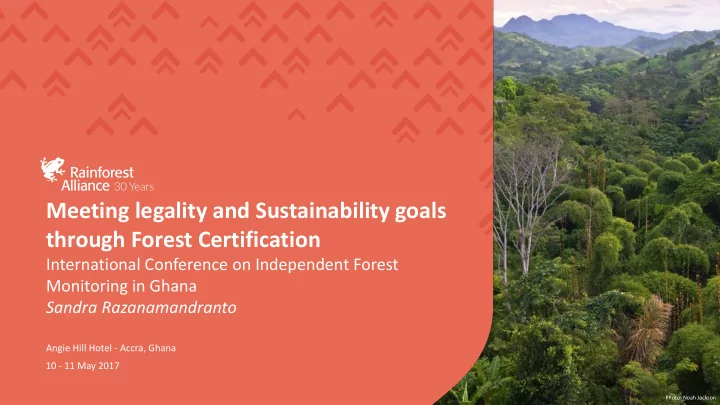

Meeting legality and Sustainability goals through Forest Certification International Conference on Independent Forest Monitoring in Ghana Sandra Razanamandranto Angie Hill Hotel - Accra, Ghana 10 - 11 May 2017 Photo: Noah Jackson
AGENDA • Overview of Rainforest Alliance Certification • Forest Certification standards (legality and Sustainability standards) • How Forest Certification addresses Sustainability and legality goals • Place of Private Forest Certification within FLEGT/VPA and EUTR process RAINFOREST-ALLIANCE.ORG 2
Overview of Rainforest Alliance Certification
What is the Rainforest Alliance? • We are an international nonprofit organization, based in New York and established in 1987. • We work to conserve biodiversity and ensure sustainable livelihoods by transforming … Land use practices Consumer behavior Business practices
Who we are: What is RA-Cert? RA-Cert is the auditing and certification division of the Rainforest Alliance. It combines all of Rainforest Alliance’s auditing certification, verification and validation activities in the areas of forestry, agriculture and carbon/climate.
Overview of RA-Cert worldwide ▪ About 90 total staff ▪ 20 offices worldwide About 90 total staff ▪ More than 100 countries 20 offices worldwide worldwide More than 100 countries worldwide ▪ More than 60 different 1,9 million ha farms SAN certified More than 60 different commodities commodities 39 million ha under FSC certification 6
Achievement of RA-Cert worldwide 39 million ha under FSC certification 21% of the world 40.3% of Africa FSC certified forest certified forest
Scope of RA-Cert Africa Currently in 21 countries - More than 25 different products certified: - Ibiscus, Cocoa, Banana, Mango, Tea, Curmeric, Pepper, Flower, Macadamia, Camomille, Pepermint, Green Bean, Vanilia, Basil, Coriander, Dill, Marjoram, Oregano, Parsley, Rosemary, Sage, Savory, Thyme, Timber, Rubber, Palm oil… RAINFOREST-ALLIANCE.ORG 8
Forest Certification standards
Some definitions: Legality VS Sustainability Legality: “ The quality or state of being in accordance with the law”. Legality aims to eliminate illegal logging and improve forest governance. Sustainability: a) “The ability to be maintained at a certain rate or level” b) “Avoidance of the depletion of natural resources in order to maintain an ecological balance”. Where does Forest Certification falls in these definitions? RAINFOREST-ALLIANCE.ORG 10
What is Forest Certification? “ A forest monitoring and tracking process that leads to the issuing of a certificate by an independent party, which verifies that an area of forest is managed to a defined standard”. Forest Certification initially aimed to protect of natural forests that are under threat, to generate benefits for local communities and to prevent harm to the vulnerable populations. Study done by Defra* proved that Forest Certification Schemes such as FSC and PEFC meet with 100% of legality criteria and 90% of Sustainability criteria. RAINFOREST-ALLIANCE.ORG 11
Role of a CB Certification is a SERVICE provided to CLIENTS. Why do our clients seek Sustainability or legality certification? - Access to Market, - Access to fund, - Image, How do we prove that your timber comes from legal and Sustainable Sources? - Via third party independent private certification (CoC from forest till end user), - Via all form of credible evidence other than private certification. Are we talking about Acceptable wood? Sustainable wood? Legal wood? Controlled wood? Certified wood? Verified wood? For who this terminology is important? RAINFOREST-ALLIANCE.ORG 12
Rainforest Alliance’s certification process
Continuous internal and external control of our work External control Internal control
How Forest Certification addresses Sustainability and legality goals
Content of Forest Legality standards Based on International Policies/Traitees, based on national legal instruments such as Forest Law, Environmental Law, Labor Law, Land tenure Law, Agriculture Law, Trade Law etc… RAINFOREST-ALLIANCE.ORG 16
Content of Forest Legality standards - Legal right to harvest Land tenure and management rights, Concession licenses, Management and harvesting planning, Harvesting permits. - Taxes and fees Payment of royalties and harvesting fees, Value added taxes and other sales taxes - Timber harvesting Timber harvesting regulations, Protected sites and species, Environmental requirements, Health and safety, Legal employment, - Third parties´ rights Customary rights, FPIC, Indigenous people’s rights. - Trade and transport Classification of species, quantities and qualities, Trade and transport, Offshore trading and transfer pricing, Custom regulations, Export taxes and duties, CITES RAINFOREST-ALLIANCE.ORG 17
Content of sustainability standards Manage and limit Comply with international, environmental impact national and local laws and FSC Principles Compile and follow a Comply with tenure and use management plan rights and responsibilities Monitor and assess forest Respect Indigenous Peoples management impact rights Maintain High Conservation Maintain community relations Value forests and workers rights Ensure that plantations Generate multiple benefits comply with FSC principles from the forest
Does FSC addressed Sustainability and Legal issues? 19
Place of Private Forest Certification within FLEGT/VPA and EUTR process
Place of Private Forest Certification within FLEGT/VPA process Private Forest Certification FLEGT/VPA Address sustainability issues as well as legality issues Focus on legality and fight against illegal logging Voluntary approach Voluntary at country level but compulsory for all that wish to reach EU Markets Marketing tool Condition to access market Label certifies a Forest Management FLEGT licenses is for timber Independent private accreditation system Frequency of audits once a year Frequency of audit depending on country Developed with participatory approach from main stakeholders Public reports If non conformity, “illegal timber” is not confiscated If non conformity, “illegal timber” is confiscated Audit done by independent party Cost to be bear by companies? Based on International Forest Policies RAINFOREST-ALLIANCE.ORG 21
APV/Due diligence within EUTR APV for producers, EUTR for buyers in Europe. FLEGT licenses recognize FSC Schemes in Cameroon, Republic of Congo. Private forest certification schemes not recognized by EUTR, however can be used as a tool to address due diligence as FSC PCI do have a risk analysis system. RAINFOREST-ALLIANCE.ORG 22
Merci! www.rainforest-alliance.org
Recommend
More recommend